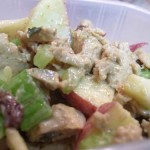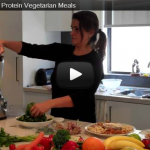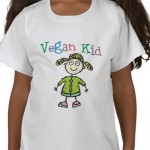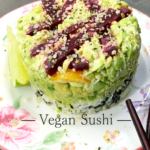If these words are found on a nutrition label, that food has milk in it: caseinate, casein, curds, dry milk solids, non-fat dry milk, and whey. Products which often contain milk include baked products, chocolate desserts and candies, sherbet, puddings, non-dairy creamers and whipped toppings, margarine, and whipped potatoes.
If these words are on a label, the food is made with egg: albumin, ovomucin, ovomucoid, vitellin, ovovitellin, livetin, powdered or dried egg, and ovoglobulin. Eggs are often found in baking mixes, batter-fried foods, baked products, breads, custard, sherbet, coffee, root beer, noodles, egg substitutes, sauces, and soups.
Where can I buy vegetarian ingredients?
As more and more people become vegetarian, more and more grocery stores are stocking vegetarian and vegan foods, like soymilk, tofu, dairy substitutes and veggie burgers. Some larger stores are even adding a “natural foods” aisle, where you can find soy cheeses, a variety of vegetarian deli meats, and whole grains, among other products. Shopping for vegetarian groceries has never been easier! Read on to find out where else to shop to stock your vegetarian kitchen.
Natural Foods Stores, Health Food Stores, Co-ops
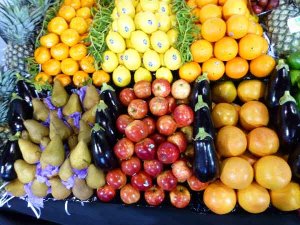 Natural foods stores, health food stores, and co-op groceries are great sources for items like seitan, tempeh, and soy products that can’t be found at your regular grocer. One of the largest natural foods chains in the United States is Whole Foods. Check your yellow pages under either “Natural Foods” or “Health Foods” to find natural foods stores in your community or search the Green People website online. Many natural foods stores have a bulk section, where you can purchase as little or as much of an item as you’d like. If you can’t find a particular item that you’re looking for, most health food stores and co-ops are also happy to fill special orders, so be sure to ask! Trader Joe’s, a specialty grocery chain, is also a good source for vegetarian mock meats and soy products.
Natural foods stores, health food stores, and co-op groceries are great sources for items like seitan, tempeh, and soy products that can’t be found at your regular grocer. One of the largest natural foods chains in the United States is Whole Foods. Check your yellow pages under either “Natural Foods” or “Health Foods” to find natural foods stores in your community or search the Green People website online. Many natural foods stores have a bulk section, where you can purchase as little or as much of an item as you’d like. If you can’t find a particular item that you’re looking for, most health food stores and co-ops are also happy to fill special orders, so be sure to ask! Trader Joe’s, a specialty grocery chain, is also a good source for vegetarian mock meats and soy products.
Produce Stands, Farmers Markets
Depending on where you live, you may have access to a seasonal or weekly farmers market, where local growers sell organic fruits, vegetables, free-range eggs and more. Produce is usually cheaper at these markets, as it comes directly from the source. If you’ve never been to a farmers market, allow yourself extra time to browse and chat with farmers about their products. Produce stands vary from rural stands that just sell a few items to large stores that carry much more than fruits and vegetables. You may be able to find a few specialty items at larger produce stands as well– things like spices, tofu and dairy-free salad dressings.
Ethnic Grocers
Ethnic grocers are a great way to explore new flavors and tastes! Most Asian grocers sell tofu, miso, noodles, stir-fry sauces, vegetable broth, and seaweed, often at a much lower price than natural foods stores. Try out new sauces for stir-fries or tofu marinades. Depending on the size of the store, you may also find exotic fruits and vegetables and a variety of mock meat products. I like to buy tea and spices at my local Asian grocer as well because the selection is usually superior and the prices reasonable. Middle Eastern and Greek grocers can also be a source for exploring new flavors. Look for grape leaves, hummus, tahini, baba ganoush, falafel and grains. Jewish or kosher stores carry a variety of dairy-free items as well, including a variety of products from the popular Kosher Parve brand Tofutti.
If there’s no health food store in your area, there are a few places online where you can buy just about anything you need for your vegetarian kitchen. A few of the best are Pangea Vegan Store for baking goods, sauces and desserts, Vege Cyber, for mock meats like vegetarian ham and textured vegetable protein (TVP) and Food Fight Grocery for vegan specialty items, snacks and treats.

